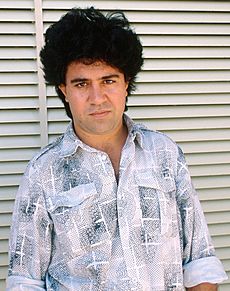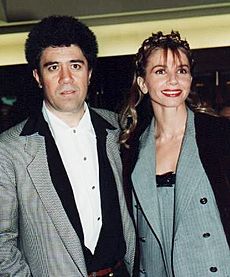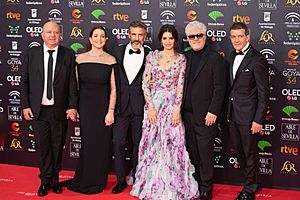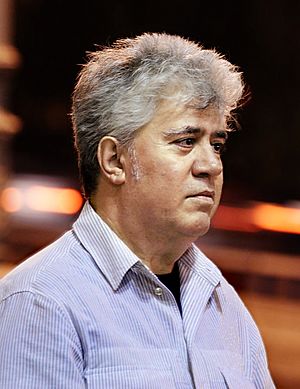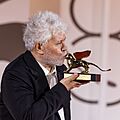Pedro Almodóvar facts for kids
Quick facts for kids
Pedro Almodóvar
|
|
|---|---|
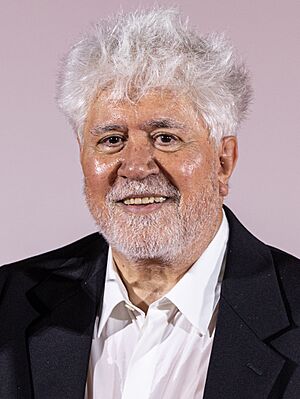
Almodóvar in 2024
|
|
| Born |
Pedro Almodóvar Caballero
25 September 1949 Calzada de Calatrava, Spain
|
| Occupation |
|
| Years active | 1974–present |
| Partner(s) | Fernando Iglesias (2002–present) |
| Relatives | Agustín Almodóvar (brother) |
| Awards | Full list |
| Signature | |
Pedro Almodóvar Caballero is a famous Spanish film director and writer. He was born on September 25, 1949. His movies are known for their strong emotions, bright colors, and interesting stories. He often explores themes like family, motherhood, and finding your identity. He is one of the most successful Spanish filmmakers around the world. Many people love his films.
Almodóvar's career grew during a time called La Movida Madrileña. This was a cultural movement in Spain after a period of strict rule. His early films showed the new freedoms of this time. In 1986, he started his own film company, El Deseo, with his younger brother Agustín Almodóvar. His brother has produced all his films since Law of Desire (1987). His big breakthrough film was Women on the Verge of a Nervous Breakdown (1988). This movie was nominated for an Academy Award for Best Foreign Language Film.
He became even more successful, often working with actors like Antonio Banderas and Penélope Cruz. He directed popular films such as Tie Me Up! Tie Me Down! (1989) and High Heels (1991). His films All About My Mother (1999) and Talk to Her (2002) won him an Academy Award each. He won for Best International Feature Film and Best Original Screenplay. Later films like Volver (2006) and Pain and Glory (2019) were also highly praised. He has also directed short films like The Human Voice (2020). His first English-language feature film, The Room Next Door (2024), won the Golden Lion at the 81st Venice International Film Festival.
Almodóvar has won many awards. These include an Academy Award, two Golden Globe Awards, and five BAFTA Awards. He also received the French Legion of Honour in 1997. In 2019, he received the Golden Lion for Lifetime Achievement. He has also received honorary degrees from Harvard University and the University of Oxford.
Contents
Early Life and Education
Pedro Almodóvar Caballero was born on September 25, 1949. He grew up in Calzada de Calatrava, a small town in Spain. He has two older sisters and one brother, Agustín. His father was a winemaker, and his mother helped people read and write letters.
When he was eight, his family sent him to a religious boarding school. They hoped he might become a priest. Later, his family moved to Cáceres, where his father opened a gas station. His mother also opened a place to sell her wine. Cáceres had a cinema, which Calzada did not. Almodóvar later said, "Cinema became my real education."
Against his parents' wishes, Almodóvar moved to Madrid in 1967. He wanted to become a filmmaker. The National School of Cinema in Madrid was closed at the time. So, Almodóvar taught himself about filmmaking. He worked many jobs to support himself. He sold used items and worked for a phone company for 12 years.
Filmmaking Career
Early Work and Short Films (1974–1979)
In the early 1970s, Almodóvar became interested in experimental films and theater. He joined a theater group called Los Goliardos. There, he met actress Carmen Maura. Madrid's lively cultural scene was perfect for Almodóvar. He was a key figure in La Movida Madrileña. This was a time of cultural rebirth after the end of Francisco Franco's rule.
Almodóvar also wrote articles for newspapers and magazines. He contributed to comic strips and stories. He bought his first camera, a Super-8, when he was 22. He started making short films. By the late 1970s, these shorts were shown in Madrid's night spots. Many of these early films had no sound. Almodóvar would play the voices and music live during the screenings.
Rise to Prominence (1980–1987)
His first full-length film was Pepi, Luci, Bom (1980). It was made with a very small budget. The film is about the friendship between Pepi, Luci, and Bom, a punk rock singer. It showed the cultural and social freedom of the time. The film was noted for its raw style. It became very popular in Spain.
His second film, Labyrinth of Passion (1982), is about a pop star, Sexila, who falls in love with a prince. This film also captured the spirit of liberation in Madrid. It was his first time working with actor Antonio Banderas.
For Dark Habits (1983), Almodóvar was asked to make a film starring Cristina Sánchez Pascual. He changed the script to make other characters more important. This film had a more serious tone with funny parts. It features an almost all-female cast, including actresses he would work with again. The film was controversial but became a success.
What Have I Done to Deserve This? (1984) stars Carmen Maura as Gloria, an unhappy housewife. The film shows female frustration and family problems in post-Franco Spain.
Almodóvar's success led him to work with producer Andrés Vicente Gómez for Matador (1986). This film explores a darker side of human nature. It features Antonio Banderas as a bullfighting student. Almodóvar explained that his films aim for "greater freedom."
After Matador, Almodóvar started his own company, El Deseo, with his brother Agustín. Their first film was Law of Desire (1987). This film explores a complicated love story. It was praised for its unique portrayal of characters. The film won the first ever Teddy Award at the Berlin International Film Festival.
Stardom and Critical Acclaim (1988–2002)
Almodóvar's first big international success was Women on the Verge of a Nervous Breakdown (1988). This comedy is about Pepa (Carmen Maura) trying to find her boyfriend. It showed Almodóvar's talent for directing women. He said women make more interesting characters. The film was a hit in the US and earned Almodóvar his first Academy Award nomination.
His next film, Tie Me Up! Tie Me Down! (1990), starred Antonio Banderas and Victoria Abril. It tells the story of a patient who kidnaps an actress. Despite some dark parts, it's a romantic comedy. The film faced issues with its rating in the US but helped change how films with mature themes were rated.
High Heels (1991) is about the difficult relationship between a famous singer and her daughter. The film was inspired by old Hollywood movies about mothers and daughters. It was a box office success in Spain and won a César Award for Best Foreign Film in France.
His film Kika (1993) is about a makeup artist who gets involved in strange situations. Almodóvar used this film to criticize sensational media. The film received negative reviews and Almodóvar later called it one of his weaker works.
In The Flower of My Secret (1995), a romance writer faces personal and professional challenges. This film marked a change in Almodóvar's style. It was his first time working with composer Alberto Iglesias.
Live Flesh (1997) was Almodóvar's first film based on a novel. It follows a man released from prison who seeks a new life. This film marked his first collaboration with Penélope Cruz. It also starred Javier Bardem.
All About My Mother (1999) is about a woman, Manuela, who loses her son. She then searches for his other parent. The film explores themes of family and friendship among women. It won the Best Director award at the 1999 Cannes Film Festival. It also won the Academy Award for Best Foreign Language Film and many other awards.
After All About My Mother, Almodóvar made Talk to Her (2002). This film is about two men who become friends while caring for women in a coma. It combines dance and silent film elements. The film was highly praised and won Almodóvar his first Academy Award for Best Original Screenplay.
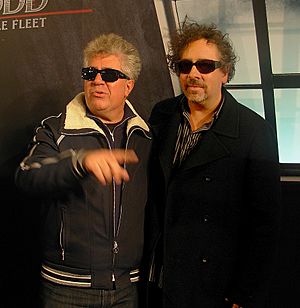
Established Director (2004–2016)
Two years later, Almodóvar released Bad Education (2004). This film tells a complex story of childhood experiences and mixed identities. It uses a "film within a film" structure. The film was the first Spanish film to open the 2004 Cannes Film Festival.
Volver (2006) is a mix of comedy, family drama, and a ghost story. It is set in Almodóvar's home region and follows three generations of women. The film is about the strength of women. It stars Penélope Cruz and reunited him with Carmen Maura. Volver was very personal to Almodóvar, using parts of his own childhood. It won awards at the 2006 Cannes Film Festival. Penélope Cruz was nominated for an Academy Award for Best Actress.
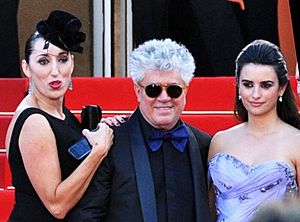
Almodóvar's next film was Broken Embraces (2009). This romantic thriller is about a blind novelist who looks back on his life. It has a complex structure, mixing past and present. The film was praised by critics and nominated for several awards.
The Skin I Live In (2011) is a psychological thriller. It is about a plastic surgeon obsessed with creating special skin. This film reunited Almodóvar with Antonio Banderas after many years. It also starred Elena Anaya. The film won the BAFTA Award for Best Film Not in the English Language.
After a period of serious dramas, Almodóvar made a comedy, I'm So Excited (2013). The film is set mostly on an airplane where passengers deal with a problem. It brought back the fun, campy humor of his earlier works.
For his 20th feature film, Almodóvar returned to drama with Julieta (2016). It stars Emma Suárez and Adriana Ugarte as the same character at different ages. The film received positive reviews and competed for the Palme d'Or at the 2016 Cannes Film Festival.
Recent Works (2019–Present)
Almodóvar's film Pain and Glory (2019) was released in Spain. It competed for the Palme d'Or at the 2019 Cannes Film Festival. The film is about an aging film director reflecting on his life. Antonio Banderas plays the director, and Penelope Cruz plays his mother in flashbacks. Almodóvar has said the film is partly about his own life. It was nominated for an Academy Award for Best International Feature Film.
In 2021, he released Parallel Mothers. This drama is about two mothers who give birth on the same day. It follows their lives as they raise their children. The film opened the 78th Venice International Film Festival. Penelope Cruz won an award for Best Actress for her role.
During the COVID-19 pandemic, Almodóvar directed the short film The Human Voice (2020) starring Tilda Swinton. He also directed another short film, Strange Way of Life (2023), a Western drama. It stars Ethan Hawke and Pedro Pascal.
In 2024, Almodóvar published his first collection of short stories, The Last Dream. He described it as a "fragmentary autobiography."
The Room Next Door (2024) is Almodóvar's first full-length English-language film. It stars Tilda Swinton and Julianne Moore. The film won the Golden Lion at the 2024 Venice Film Festival. This made it the first Spanish film to win this top prize.
His next film, Bitter Christmas, is expected to start filming in June 2025. It is described as a "tragic comedy about gender."
Artistic Style
Almodóvar has a very recognizable style in his films. He often uses repeating themes and visual elements. These include strong female characters, bold colors, and detailed sets. He also uses music, from pop songs to original compositions.
His films often feature characters dealing with difficult situations. He is known for showing how people overcome challenges. Many of his characters find a way to understand things, even if they can't forgive. He aims to create characters who are free and independent.
Almodóvar has been influenced by many filmmakers. These include old Hollywood directors like George Cukor and Billy Wilder. He also takes inspiration from Alfred Hitchcock and European directors like Ingmar Bergman. He often includes references to other films, theater, and art in his work.
He is famous for his films that focus on women. He often shows women overcoming difficulties and the strength of female friendships. He was influenced by classic Hollywood films where everything happens around a main female character. He often says that women in his childhood were strong and shaped his character.
Critics say Almodóvar has changed how people see Spanish cinema. He often includes Spanish symbols like bullfighting and flamenco in his films. Most of his films are shot in Madrid. He believes his films are very Spanish but also very personal. He is generally more praised by critics outside of Spain.
Almodóvar believes all his films are political, even the lighter ones. But he says he doesn't try to push specific political ideas. He mainly wants to entertain and create emotion. He wanted to create a world in his early films where the strict rules of the past didn't exist. He wanted to give a voice to groups who were not often heard in Spain.
He served as the head of the jury for the 2017 Cannes Film Festival.
Frequent Collaborators
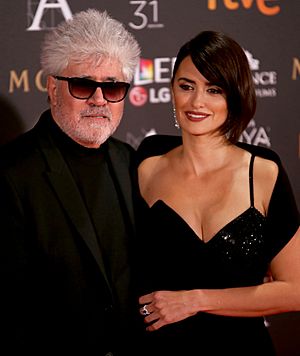
Almodóvar often works with the same actors in many of his films. Some actors who have appeared in three or more of his films include Chus Lampreave (8 times), Antonio Banderas (8 times), Rossy de Palma (8 times), Carmen Maura (7 times), Cecilia Roth (7 times), and Penélope Cruz (7 times). These actresses are sometimes called "Almodóvar girls."
His brother, Agustín Almodóvar, has produced all his films since 1986. Film editor José Salcedo edited all of Almodóvar's films from 1980 until his death in 2017. Cinematographer José Luis Alcaine has worked on six of his films. Composer Alberto Iglesias has created the music for all of Almodóvar's films since 1995.
|
Work
Actor
|
1980 | 1982 | 1983 | 1984 | 1986 | 1987 | 1988 | 1990 | 1991 | 1993 | 1995 | 1997 | 1999 | 2002 | 2004 | 2006 | 2009 | 2011 | 2013 | 2016 | 2019 | 2021 | 2024 |
|---|---|---|---|---|---|---|---|---|---|---|---|---|---|---|---|---|---|---|---|---|---|---|---|
| Victoria Abril | |||||||||||||||||||||||
| Elena Anaya | |||||||||||||||||||||||
| Raúl Arévalo | |||||||||||||||||||||||
| Antonio Banderas | |||||||||||||||||||||||
| Lupe Barrado | |||||||||||||||||||||||
| Javier Cámara | |||||||||||||||||||||||
| Penélope Cruz | |||||||||||||||||||||||
| Lola Dueñas | |||||||||||||||||||||||
| Bibiana Fernández | |||||||||||||||||||||||
| Verónica Forqué | |||||||||||||||||||||||
| Chus Lampreave | |||||||||||||||||||||||
| Loles León | |||||||||||||||||||||||
| Fabio McNamara | |||||||||||||||||||||||
| Kiti Manver | |||||||||||||||||||||||
| Carmen Maura | |||||||||||||||||||||||
| Rossy de Palma | |||||||||||||||||||||||
| Marisa Paredes | |||||||||||||||||||||||
| Eusebio Poncela | |||||||||||||||||||||||
| Cecilia Roth | |||||||||||||||||||||||
| Assumpta Serna | |||||||||||||||||||||||
| Julieta Serrano | |||||||||||||||||||||||
| Eva Siva | |||||||||||||||||||||||
| Paz Vega |
Personal Life
Almodóvar is openly gay. He has been with his partner, Fernando Iglesias, since 2002. Fernando Iglesias is an actor and photographer who sometimes appears in small roles in Almodóvar's films. They live in separate homes in Madrid.
In 2016, a week before his film Julieta was released, Pedro and Agustín Almodóvar were mentioned in news about company records from 1991 to 1994. Agustín stated he was responsible for financial matters and that they always followed Spanish tax laws. Pedro said he didn't know about the details but took full responsibility. Agustín later said he believed this news affected Julieta's success in Spain.
In a 2025 documentary, Almodóvar mentioned Kika and I'm So Excited! as his least favorite films. He considers All About My Mother, Talk to Her, and Bad Education to be his most successful works.
Filmography
Short Film
| Year | Title | Director | Writer | Notes |
|---|---|---|---|---|
| 1974 | Film político | Yes | Yes | |
| Dos putas, o historia de amor que termina en boda | Yes | Yes | ||
| 1975 | La caída de Sódoma | Yes | Yes | |
| Homenaje | Yes | Yes | ||
| El sueño, o la estrella | Yes | Yes | ||
| Blancor | Yes | Yes | ||
| 1976 | Sea caritativo | Yes | Yes | |
| Muerte en la carretera | Yes | Yes | ||
| 1977 | Sexo va, sexo viene | Yes | Yes | |
| 1978 | Salomé | Yes | Yes | |
| 1985 | Tráiler para amantes de lo prohibido! | Yes | Yes | TV short |
| 1996 | Pastas Ardilla | Yes | Yes | TV advert |
| 2009 | La concejala antropófaga | Yes | Yes | Credited as "Mateo Blanco" (director) and as "Harry 'Huracán' Caine" (writer) |
| 2020 | The Human Voice | Yes | Yes | |
| 2023 | Strange Way of Life | Yes | Yes |
Feature Film
| Year | English title | Director | Writer | Producer | Original title |
|---|---|---|---|---|---|
| 1980 | Pepi, Luci, Bom and Other Girls on the Heap | Yes | Yes | No | Pepi, Luci, Bom y otras chicas del montón |
| 1982 | Labyrinth of Passion | Yes | Yes | Yes | Laberinto de pasiones |
| 1983 | Dark Habits | Yes | Yes | No | Entre tinieblas |
| 1984 | What Have I Done to Deserve This? | Yes | Yes | No | ¿Qué he hecho yo para merecer esto? |
| 1986 | Matador | Yes | Yes | No | Matador |
| 1987 | Law of Desire | Yes | Yes | No | La ley del deseo |
| 1988 | Women on the Verge of a Nervous Breakdown | Yes | Yes | Yes | Mujeres al borde de un ataque de nervios |
| 1989 | Tie Me Up! Tie Me Down! | Yes | Yes | No | ¡Átame! |
| 1991 | High Heels | Yes | Yes | No | Tacones lejanos |
| 1993 | Kika | Yes | Yes | No | Kika |
| 1995 | The Flower of My Secret | Yes | Yes | No | La flor de mi secreto |
| 1997 | Live Flesh | Yes | Yes | No | Carne trémula |
| 1999 | All About My Mother | Yes | Yes | No | Todo sobre mi madre |
| 2002 | Talk to Her | Yes | Yes | No | Hable con ella |
| 2004 | Bad Education | Yes | Yes | Yes | La mala educación |
| 2006 | Volver | Yes | Yes | No | Volver |
| 2009 | Broken Embraces | Yes | Yes | No | Los abrazos rotos |
| 2011 | The Skin I Live In | Yes | Yes | No | La piel que habito |
| 2013 | I'm So Excited! | Yes | Yes | No | Los amantes pasajeros |
| 2016 | Julieta | Yes | Yes | No | Julieta |
| 2019 | Pain and Glory | Yes | Yes | No | Dolor y gloria |
| 2021 | Parallel Mothers | Yes | Yes | No | Madres paralelas |
| 2024 | The Room Next Door | Yes | Yes | No | La habitación de al lado |
| 2026 | Bitter Christmas | Yes | N/A | N/A | Amarga Navidad |
Awards and Nominations
| Year | Title | Academy Awards | BAFTA Awards | Golden Globe Awards | Goya Awards | ||||
|---|---|---|---|---|---|---|---|---|---|
| Nominations | Wins | Nominations | Wins | Nominations | Wins | Nominations | Wins | ||
| 1986 | Matador | 1 | |||||||
| 1988 | Women on the Verge of a Nervous Breakdown | 1 | 1 | 1 | 16 | 5 | |||
| 1991 | High Heels | 1 | 5 | ||||||
| 1997 | Live Flesh | 1 | 3 | 1 | |||||
| 1999 | All About My Mother | 1 | 1 | 3 | 2 | 1 | 1 | 14 | 7 |
| 2002 | Talk to Her | 2 | 1 | 2 | 2 | 1 | 7 | 1 | |
| 2004 | Bad Education | 1 | 4 | ||||||
| 2006 | Volver | 1 | 2 | 2 | 14 | 5 | |||
| 2009 | Broken Embraces | 1 | 1 | 5 | 1 | ||||
| 2011 | The Skin I Live In | 1 | 1 | 1 | 16 | 4 | |||
| 2013 | I'm So Excited! | 1 | |||||||
| 2016 | Julieta | 1 | 7 | 1 | |||||
| 2019 | Pain and Glory | 2 | 1 | 2 | 16 | 7 | |||
| 2021 | Parallel Mothers | 2 | 1 | 2 | 8 | ||||
| 2024 | The Room Next Door | 1 | 10 | 3 | |||||
| Total | 9 | 2 | 14 | 5 | 13 | 1 | 137 | 35 | |
Images for kids
-
Almodóvar won the Golden Lion at the 81st Venice International Film Festival
See also
 In Spanish: Pedro Almodóvar para niños
In Spanish: Pedro Almodóvar para niños


